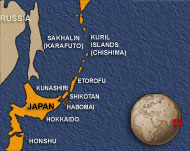Japanese insulated from world news
Hiroko Endo has travelled abroad, likes Mediterranean cuisine and studies English. At 28, she is of the generation who will comprise Japan’s future diplomats, business professionals, and strategists.

But when asked her opinion of the controversy surrounding the Prophet Muhammad cartoons in Europe and the Middle East, she raises an eyebrow.
“I’m sorry but I don’t know this story,” says the young book publisher.
Endo is not alone. Despite Japan’s massive global influence, many Japanese have nominal interest in events elsewhere.
While the cartoons sparked embassy burnings and violent demonstrations, and set in motion cultural dialogue, health worker Yuka Nakamura, 40, said: “This is the first time I’ve heard of this. I’m too busy to read a newspaper.”
Chika Sugiyama, 31, an office assistant, voiced similar reaction. “I know something’s happening, but I’m not really sure what,” she said.
Time and geography
Lady Toshiko Marks, professor of international understanding at Shumei University, explains that because of long working hours, many Japanese may not have enough time or energy to follow up on international news.
She also believes Japan’s geographic location plays a role.
“Although Japanese people travel the world, Japan itself is located in this corner, isolated from everywhere, and up to now has been living on its own efforts,” she told Aljazeera.net.
Japan’s sense of being “an island apart” can be traced back to the “closed country” policy of the 17th century. For 250 years, entering or leaving Japan was punishable by death.
Whilst the post-World War II generation focused on rebuilding the infrastructure and economy of a devastated country, issues abroad paled in significance.
The continuing presence of US military bases in Japan, Marks argues, has meant that military issues abroad were of little interest to the Japanese.
People like Endo therefore feel somewhat detached from global problems, believing that America will ultimately protect Japan.
“We can avoid anything bad because America will protect us … we don’t think about international affairs.”
Domestic focus
To combat this sense of isolation, Marks encourages her students to spend time abroad – not for a chaperoned holiday, but to develop a better understanding of the outside world.
“Why, we don’t need to” is the reaction she usually encounters when she tries to convince them of the need to broaden their horizons.
|
“It’s more like the Japanese aren’t interested in news in general” Kentaro Tanaka, |
“The Japanese are somehow lacking a certain curiosity about other cultures,” Marks says.
The situation is not helped by the limited attention given to international affairs by the Japanese media. Local media focus almost exclusively on domestic news.
“Japanese news programmes don’t really show that much international news,” says Taeko Matsumoto, an office worker.
Japanese journalist Taro Tetsutomo bases the trend on simple supply and demand theory. “First and foremost, a newspaper has to consider the demands and needs of its customers,” he says. If the demand for international stories is low, then the supply will reflect that, he says.
Cartoon row
So what of the Danish cartoons and the controversy they sparked?
Tomohiko Taniguchi of the Ministry of Foreign Affairs appreciates the conduct of the local press who made “no attempt … to carry the cartoons”.
He told Aljazeera.net that Japan was spared the spectre of embassies being attacked, and lauded the conduct of the public.
 |
|
Some believe Japan’s geographic |
“Indeed no incident has occurred,” he said.
Haroon Qureshi of the Japan Islamic Trust said a demonstration was considered but dismissed in favour of sending a representative “to meet the Danish ambassador and deliver a letter of polite protest”.
“The Japanese people have nothing to do with this issue,” he said.
In fact, most Japanese may not even bat an eyelid.
With just 0.6% of the 130 million-strong population being non-Japanese, multicultural issues and minority communities are barely visible.
And with a maximum of 200,000 Muslims in the country, the Japanese know very little about Islam.
Masayuki Sumiyoshi, 51, couldn’t understand the uproar in the wake of the cartoons’ republication.
Learn-by-rote
Marks believes the failure to understand the core issues behind the cartoons furore can be explain by Japanese avoidance of a clash between views.
“They don’t like debate, they don’t like argument,” she said.
 |
|
A Japanese army contingent is |
Japan‘s education system may also hinder understanding as it has been criticised as a learn-by-rote system granting little opportunity for students to express their opinions, leading to a culture of authority and acceptance.
This may explain the view of 23-year-old student Kentaro Tanaka.
“It’s not that Japanese aren’t interested in international news,” he says. “It’s more like the Japanese aren’t interested in news in general.”
But things are changing. With Japan’s Self-Defence Force (military) now fully engaged in Iraq, the Japanese public are being forced to consider the outside world despite limited media coverage of operations there.
Borderless world
Software engineer Tsuyoshi Honda, 29, believes that in a borderless world, as the self-sufficiency of the 1980s economic boom becomes a thing of the past, “the Japanese will need to know about foreign affairs as well”.
However, Marks expresses caution pointing to the dominance of American culture in Japan brought upon by the post-war occupation and administration.
“When Japanese people say they have to listen to other people, they normally mean Americans, not other cultures.”